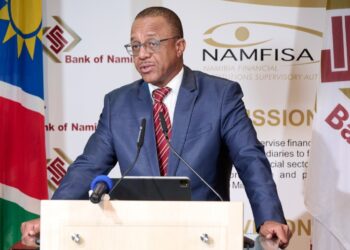
The Agricultural Bank of Namibia (AgriBank) says continued rate hikes by the Bank of Namibia in an effort to contain inflation are threatening its ability to continue advancing loans to farmers.
The agro lender is of the view that such policy measures increase the cost of borrowing and slow down economic activities.
“It is becoming extremely difficult to obtain affordable funding, particularly for Agribank to on-lend to the agriculture sector at affordable rates. This prompts the need for the bank to continuously engage stakeholders and shareholders for funding support and risk-sharing instruments such as guarantees; and this effectively undermines the Bank’s ability to perform on its mandate of socio-economic transformation,†the Bank said in its latest quarterly report.
Namibia’s repo rate is currently at 7%, while inflation is 7.2%, which the Bank says is pushed by economic activities in South Africa where the Namibia Dollar is pegged. South Africa’s February inflation is at 7% while the repo is 7.75%.
Namibia imports most of its inflation and due to the persistent rise in inflation in both SA and in Namibia, the Central Banks now find themselves at crossroads where economic prospects have weakened while inflation is not yet fully under control and fiscal challenges remain.
Inflation is further exacerbated by ongoing geopolitical tensions, fading pent-up demand, low disposable and income, amongst others.
“Although Namibia MPC does not directly aim to control inflation but to maintain the one-to-one peg with South Africa, it indirectly controls inflation through controlling the demand through the availability of money in circulation,†AgriBank said.
“Over tightening of monetary policy would drive the economy into unnecessary harsh slowdown resulting from the increase in the cost of borrowing which stifles both business and individuals’ confidence.â€
Unfavourable climatic conditions were also highlighted as it remains a key risk to the performance of the agriculture sector and the Bank in terms of collection and loan book growth; “hence there is need for Agribank to continuously explore opportunities for innovative financing and non-financial support services to the clients.â€
Farmers are therefore encouraged to prepare for the worst-case scenarios, ramp up diversification strategies and production technologies to mitigate the impact of climate change and unleash opportunities in the food system.Â
The report further indicates that inflationary pressures are projected to gradually reduce, amid weakening aggregate demand in the global economy.Â
This, the bank says, will allow the US Federal Reserve and other major central banks to slow the pace of monetary tightening and, eventually, shift gears to a more accommodative monetary policy stance.
“The near-term economic outlook remains highly uncertain, however, as a myriad of economic, financial, geopolitical, and environmental risks persist,†the Bank said.
The world GDP is projected to decelerate from an estimated 3.0% in 2022 to 1.9% in 2023, marking one of the lowest growth rates in recent decades. In 2024, global growth is forecasted to rise to 2.7% due to the expected normalisation of current macroeconomic headwinds.Â
The report states that Namibia is no exception as growth is expected to drop to 2.7% in 2023 compared to 4.6% recorded in 2022.
The Namibian economy recorded an upbeat growth of 4.6% in 2022 compared to a 3.5% growth rate recorded in 2021. The upsurge in growth is attributed to increases in the primary and secondary industries of 12.9% and 3.3%, respectively.
“The acceleration was observed across all major sectors, particularly the mining sector as diamond production rose. In 2023, primary industries are expected to remain resilient on the back of the ongoing oil exploration and appraisal activities and robust growth from diamond production from the Benguela Gem mining vessel. The economy is expected to record a growth of 2.7% in 2023,†the report said.
Â
Â
Â











